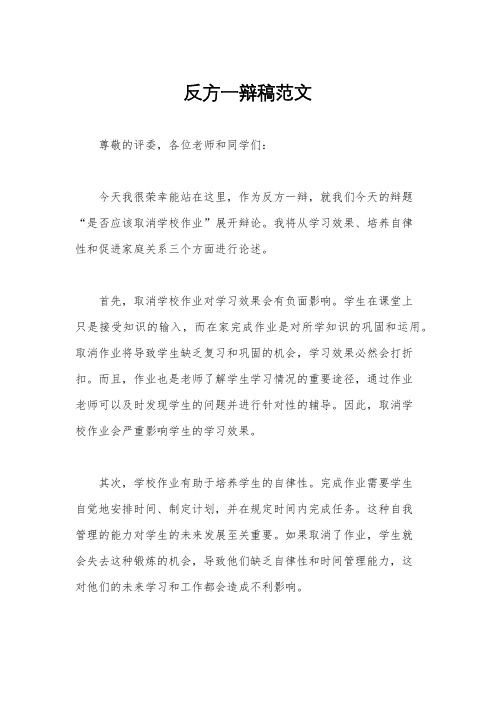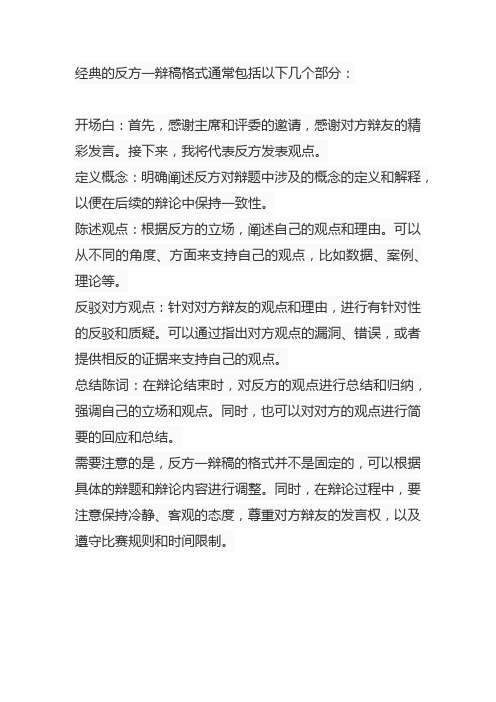反方一辩稿
反方一辩稿范文

反方一辩稿范文
尊敬的评委,各位老师和同学们:
今天我很荣幸能站在这里,作为反方一辩,就我们今天的辩题“是否应该取消学校作业”展开辩论。
我将从学习效果、培养自律
性和促进家庭关系三个方面进行论述。
首先,取消学校作业对学习效果会有负面影响。
学生在课堂上
只是接受知识的输入,而在家完成作业是对所学知识的巩固和运用。
取消作业将导致学生缺乏复习和巩固的机会,学习效果必然会打折扣。
而且,作业也是老师了解学生学习情况的重要途径,通过作业
老师可以及时发现学生的问题并进行针对性的辅导。
因此,取消学
校作业会严重影响学生的学习效果。
其次,学校作业有助于培养学生的自律性。
完成作业需要学生
自觉地安排时间、制定计划,并在规定时间内完成任务。
这种自我
管理的能力对学生的未来发展至关重要。
如果取消了作业,学生就
会失去这种锻炼的机会,导致他们缺乏自律性和时间管理能力,这
对他们的未来学习和工作都会造成不利影响。
最后,学校作业也有助于促进家庭关系。
家长可以通过帮助孩
子完成作业,了解孩子在学校的学习情况,增进亲子关系。
而且,
家长可以在孩子完成作业的过程中,对孩子进行正确的引导和教育,这对孩子的成长也是非常有益的。
如果取消了学校作业,这种促进
家庭关系的机会就会大大减少。
综上所述,取消学校作业是不可取的。
学校作业对学习效果、
培养自律性和促进家庭关系都有着重要的作用。
我们应该更多地关
注如何合理设置作业,而不是一味地取消作业。
感谢大家的聆听。
谢谢!。
反方一辩发言稿

反方一辩发言稿尊敬的主持人、尊敬的评委、亲爱的观众们:首先,我想通过今天的辩论,强调反对方的观点。
我们生活在一个不可避免地与科技相辅相成的时代,科技的发展毫无疑问地给我们带来了诸多便利与进步。
但我们不能忽视科技发展背后的深层问题。
首先,让我们来看看科技发展对人类社会产生的负面影响。
随着科技的迅速发展,人们变得越来越依赖智能设备和互联网。
我们的生活变得越来越便捷,却也越来越孤独。
实际上,我们与现实世界的交流和沟通正在逐渐减少,取而代之的是社交媒体和虚拟世界的连接。
这种孤独感导致了许多心理问题,例如抑郁症和社交障碍等。
科技的发展正在破坏人们之间的真实互动,削弱了人类的情感联系。
其次,我们不能忽视科技进步对环境的影响。
科技发展推动了各行各业的现代化,但同时也带来了环境污染和资源浪费问题。
过度依赖科技,使得我们更加盲目地消耗着地球上有限的资源。
而且,电子垃圾的快速堆积和高能耗的电子设备进一步加剧了环境的恶化。
我们在追求高科技的同时,不可避免地在对环境造成负面影响。
最后,我们应当关注科技发展带来的道德和伦理问题。
人工智能、基因编辑等领域的进步虽然给我们带来了许多新兴技术,但同时也引发了伦理边界的讨论。
例如,人工智能可能导致失去大量工作岗位,基因编辑可能带来道德纠纷。
我们应当慎重对待这些技术的应用,避免对社会产生不可逆转的伦理和道德后果。
尊敬的评委、亲爱的观众们,科技发展无疑为我们的生活带来了诸多好处。
然而,我们也必须正视科技发展背后的负面影响。
让我们同时关注科技进步所带来的社会和环境问题,站在全面和长远的角度,审慎地对待科技的发展,确保科技始终为人类福祉服务。
谢谢!。
辩论 一辩稿

辩论一辩稿
辩题,是否应该取消学校作业?
一辩稿。
尊敬的评委、各位观众,我代表反方,就取消学校作业这一议题进行辩论。
首先,我们认为取消学校作业是有必要的。
学生在学校已经花费了大量的时间,回到家应该有更多的时间去休息和进行自己的兴趣爱好。
学校作业会占据学生宝贵的家庭时间,导致他们无法享受家庭生活和进行其他有益的活动。
其次,取消学校作业可以减轻学生的压力。
现代社会,学生们面临着巨大的学业压力,取消作业可以让他们有更多的时间去放松和调整心态,从而更好地面对学习和生活的挑战。
最后,取消学校作业可以促进学生的自主学习能力。
学生在课堂上已经接受了老师的指导和教育,回到家应该有更多的自主学习的机会,而不是被迫完成大量的作业。
这样可以培养学生的自主学
习能力和创造力,更有利于他们的成长和发展。
综上所述,我们认为取消学校作业是有必要的,可以让学生有更多的时间去休息和放松,减轻学业压力,促进自主学习能力的培养。
希望各位评委和观众能够支持我们的立场。
谢谢!。
反方一辩发言稿

反方一辩发言稿
尊敬的主持人、尊敬的评委老师、亲爱的同学们:
我代表反方一辩,就本次辩题“……”提出我们的观点和理由。
首先,我们反对……。
其一,……。
这是因为……。
其二,……。
这将导致……。
另外,……。
因此,我们反对……。
接下来,我将针对正方的观点进行反驳。
正方在他们的陈述中提到了……。
然而,他们没有考虑到……。
他们所用的证据和例子也不足以支撑他们的观点。
而我们反方在这方面就更强有力。
我们的论据是……。
这一点在……
另一方面,正方强调了……。
然而,他们没有意识到……。
他们的观点忽略了……的重要性。
反观我们反方,在这方面我们充分认识到……的重要性。
而且,我们还总结了……的实际案例,进一步证明了我们的观点。
此外,正方还提到了……。
这一点我们无法否认,但这是不全面的。
我们应该同时看到……。
这将导致……。
我们反方从一开始就更加客观、全面地看待问题,这使得我们的观点更具有说服力。
最后,我想强调的是,我方的观点并非完全否定了正方的,我们提出的是对于……需要更加审慎、平衡和全面的看待。
我们希望大家能够认真考虑我们的观点,并作出明智的决策。
谢谢!。
经典的反方一辩稿格式

经典的反方一辩稿格式通常包括以下几个部分:
开场白:首先,感谢主席和评委的邀请,感谢对方辩友的精彩发言。
接下来,我将代表反方发表观点。
定义概念:明确阐述反方对辩题中涉及的概念的定义和解释,以便在后续的辩论中保持一致性。
陈述观点:根据反方的立场,阐述自己的观点和理由。
可以从不同的角度、方面来支持自己的观点,比如数据、案例、理论等。
反驳对方观点:针对对方辩友的观点和理由,进行有针对性的反驳和质疑。
可以通过指出对方观点的漏洞、错误,或者提供相反的证据来支持自己的观点。
总结陈词:在辩论结束时,对反方的观点进行总结和归纳,强调自己的立场和观点。
同时,也可以对对方的观点进行简要的回应和总结。
需要注意的是,反方一辩稿的格式并不是固定的,可以根据具体的辩题和辩论内容进行调整。
同时,在辩论过程中,要注意保持冷静、客观的态度,尊重对方辩友的发言权,以及遵守比赛规则和时间限制。
经典的反方一辩稿立论

经典的反方一辩稿立论反方一辩开篇立论:当今社会求专更利于个人的发展。
各位评委老师大家好。
感谢正方一辩的精彩陈词。
我方认为:当今社会求专更利于个人的发展。
如果说求博是多多益善的话,求专就是精益求精。
首先,别把求专和无知、无德、无能相对等。
求专并不意味着在其他领域没有涉足,并不表示着对生活起居没有打理能力,并不代表对仁义廉耻的道德没有自制把控能力。
求专,是在一个正常的前提下,经过尝试、经历后,依据自己的天赋禀能、兴趣爱好、能力特长而对某一方面进行的更深入地研究和创造,是“欲穷千里目,更上一层楼”的成功与卓越。
其次,人的生命长度有限,孔子云:“吾生也有涯,而知也无涯”。
而当今社会正是一个知识大爆炸的时代。
如何将有限的精力投入到浩如烟海的无限的知识体系中去,这就体现了一层取舍的学问。
受到时间、精力等因素的限制,在追求知识广度的同时难免学而不精。
因此,我们要有取舍精神。
舍去了零碎的泛滥,取得了钻研的正经。
托尔斯泰曾说,重要的不是知识的数量,而是知识的质量。
我们不追求多多益善,我们自我要求精益求精。
正确取舍,一舍一得之间,方能显现人生智慧。
再次,现代社会的特性,决定了求专比求博更利于个人发展。
社会发展简史告诉我们,社会发展是呈螺旋状上升,而社会分工是呈树冠状发展,现代社会条件下分工越来越细,而与分工相对应的知识结构也越来越细,因此,专业也向更加复杂的方向发展,所以社会分工的细化直接要求的就是专业人才。
虽然,社会发展趋势为我们实现自身价值提供了更为广阔的空间,但对我们的专业技能也提出了更高的要求。
要想更好的立足社会、利于个人发展,就要求我们在求专上苦下工夫。
最后,我方重申下,要想发挥个人的潜力,实现个人的才华,以期更好的服务社会,就应该审时度势,正确审视自我,坚定脚步,持之以恒,努力求专,方能更好的实现人生价值。
因此,综上所述,我方认为:当今社会求专更利于个人的发展。
辩题:反方,口才比文才更重要 一辩稿
辩题:反方,口才比文才更重要一辩稿
尊敬的评委、各位同学:
今天我们的辩题是“口才比文才更重要”。
我作为反方代表,
我将从几个方面来阐述我的观点。
首先,口才在现实生活中更为重要。
无论是在工作中还是在日
常交流中,一个人的口才能力往往决定了他的表现和影响力。
一个
人可以有再多的文才,但如果他无法用流利、有说服力的语言表达
自己的观点,那么他的文才也只能是摆设。
其次,口才能够更好地传达情感和表达思想。
语言是一种交流
的工具,而口语更能够传递言语背后的情感和意图。
在演讲、辩论、交流等场合,口才能够更好地表达演讲者的情感和观点,使得观众
更容易理解和认同。
再者,口才能够更好地激发人们的热情和兴趣。
一个口若悬河
的演讲者往往能够更好地吸引听众的注意力,激发他们的兴趣,从
而更好地传达自己的观点和想法。
相比之下,文才往往显得过于冰
冷和抽象,难以引起听众的共鸣。
综上所述,口才在现实生活中更为重要,它能够更好地传达情感和思想,激发人们的热情和兴趣。
因此,我坚定地认为口才比文才更重要。
谢谢!。
关于优秀辩论稿范文一辩(范文5篇)
关于优秀辩论稿范文一辩(范文5篇)优秀辩论稿范文一辩5篇第1篇: 优秀辩论稿范文一辩反方一辩:Respected judicators, Ladies and gentlemen, good evening!In the first part of my speech, I would like to make my rebuttal. Patents do not costs lives, they save more.Our government side have proposed a radical solution to their problem: they want to ignore intellectual property, one of our most important constructs to encourage innovation. On the opposition, we believe the status quo of allowing a medicine pany to patent something and profit from it is necessary for them to have an incentive and ability to create life-saving medicines now and in the future, and it is saving lives in the long-term that concerns us.Now I’d like to provide my statements. This house would not abolish patents for life-saving medicines. For the first reason, it takes away the Incentive to Produce Life-saving medicines.Ron Polla ck said,The pharmaceutical industry“s repetitious cry that research and development would be curtailed if medicine pricesare moderated is extraordinarily misleading.Yes, research and development costs money. Yet only 14% of pharmaceuticals" budgets go to research and development. Reports have linked "high medicine prices to advertising, profits and enormous executive salaries. The report documents that medicine panies are spending more than twice as much on marketing, advertising, and administration.”Firms are incentivized to undertake research in life-saving drugs because now they have a guaranteed return on their RD investment. Regardless of the course of drug production and distribution they will be profit from their research.In addition , Scientists are principally motivated by the desire for peer recognition and also by the fact that they want to have achieved something more with their lives than reduce some teenager’s pimples by 30%. We are not dissuading research into live-saving illnes ses we’re invigorating it by offering inciting profit that is tied to results and is cost-effective.Creating a brand new medicine requires enormous amounts of money and failed attempts, and therefore involves a large amount of risk. If a person can"t be guaranteed some kind of control or return to that risk and expense, they are unlikely towant to invest in it. In particular, if a medicine pany can make more money by patenting medicines that cure hair loss, they will take that option.For the second aspect, consequences of the loss of incentives is awful.Medicine panies are trying to develop cures for cancer, diabetes and more, and will likely want to develop more cures for illnesses that e up in the future, as they did for swine flu, if they can get a return on the investment. If there is not a significant return to investment, a pany will not bother to continue to research and develop these medicines. Even if the current medicines were released for generic development, lack of future medicines would cost far more lives in the long run, and save money on alternative treatments.Furthermore, most things that cause illness, such as viruses and bacteria, develop so that they can resist medicines. We have seen this in the case of the increased ineffectiveness of antibiotics. Prop wants to change the focus of medicine production from the development of new medicines to the cheaper production of medicines that already exist. This will happen because any start-up pany or investor in the medicines industry will see that it is cheaper to simply create the medicines, rather than put moneyinto research and development, which is the most expensive part of the medicines creation process. If there is a greater focus on this, then less new medicines will be created to bat the illnesses. This structure begins to look very flawed as the illnesses develop resistances to old medicines. There needs to be a continuing incentive to create new medicines for any illness, not to simply focus on old medicines being created in larger, cheaper amounts. It is worth slightly more expensive medicines if new innovation is constantly able to happen.In conclusion, if we abolish those patents,no one would continue researching and developing new medicines,thus,abolishing patents for life-saving medicines seems to save more lives at the beginning, it would kill more lives in the long run.第2篇: 优秀辩论稿范文一辩反方一辩:Respected judicators, Ladies and gentlemen, good evening!In the first part of my speech, I would like to make my rebuttal. Patents do not costs lives, they save more.Our government side have proposed a radical solution to their problem: they want to ignore intellectual property, one of ourmost important constructs to encourage innovation. On the opposition, we believe the status quo of allowing a medicine pany to patent something and profit from it is necessary for them to have an incentive and ability to create life-saving medicines now and in the future, and it is saving lives in the long-term that concerns us.Now I’d like to provide my statements. This house would not abolish patents for life-saving medicines. For the first reason, it takes away the Incentive to Produce Life-saving medicines.Ron Pollack said,The pharmaceutical industry"s repetitious cry that research and development would be curtailed if medicine prices are moderated is extraordinarily misleading.Yes, research and development costs money. Yet only 14% of pharmaceuticals" budgets go to research and development. Reports have linked "high medicine prices to advertising, profits and enormous executive salaries. The report documents that medicine panies are spending more than twice as much on marketing, advertising, and administration.”Firms are incentivized to undertake research in life-saving drugs because now they have a guaranteed return on their RD investment. Regardless of the course of drug production anddistribution they will be profit from their research.In addition , Scientists are principally motivated by the desire for peer recognition and also by the fact that they want to have achieved something more with their lives than reduce some teenager’s pimples by 30%. We are not dissuading research into live-saving illnesses we’re invigorating it by offering inciting profit that is tied to results and is cost-effective.Creating a brand new medicine requires enormous amounts of money and failed attempts, and therefore involves a large amount of risk. If a person can"t be guaranteed some kind of control or return to that risk and expense, they are unlikely to want to invest in it. In particular, if a medicine pany can make more money by patenting medicines that cure hair loss, they will take that option.For the second aspect, consequences of the loss of incentives is awful.Medicine panies are trying to develop cures for cancer, diabetes and more, and will likely want to develop more cures for illnesses that e up in the future, as they did for swine flu, if they can get a return on the investment. If there is not a significant return to investment, a pany will not bother to continue to research and develop these medicines. Even if the currentmedicines were released for generic development, lack of future medicines would cost far more lives in the long run, and save money on alternative treatments.Furthermore, most things that cause illness, such as viruses and bacteria, develop so that they can resist medicines. We have seen this in the case of the increased ineffectiveness of antibiotics. Prop wants to change the focus of medicine production from the development of new medicines to the cheaper production of medicines that already exist. This will happen because any start-up pany or investor in the medicines industry will see that it is cheaper to simply create the medicines, rather than put money into research and development, which is the most expensive part of the medicines creation process. If there is a greater focus on this, then less new medicines will be created to bat the illnesses. This structure begins to look very flawed as the illnesses develop resistances to old medicines. There needs to be a continuing incentive to create new medicines for any illness, not to simply focus on old medicines being created in larger, cheaper amounts. It is worth slightly more expensive medicines if new innovation is constantly able to happen.In conclusion, if we abolish those patents,no one wouldcontinue researching and developing new medicines,thus,abolishing patents for life-saving medicines seems to save more lives at the beginning, it would kill more lives in the long run.THANKS !致力为企业和个人提供合同协议,策划案计划书,学习课件等等打造全网一站式需求欢迎您的下载,资料仅供参考第3篇: 优秀辩论稿范文一辩谢谢主席,谢谢评委,大家晚上好。
反方一辩发言稿
反方一辩发言稿尊敬的评委老师、各位参赛选手,大家好!我作为反方一辩,今天很荣幸能够站在这里,就本次辩题进行辩论。
首先,我要对正方提出的观点表示理解和尊重,并且我会在接下来的发言中提出我的反驳观点。
本次辩题是“是否应该禁止动物园”,我将从生物多样性保护、教育和科研以及动物福利三个方面进行反驳观点的阐述。
首先,对于生物多样性保护的问题,正方认为动物园对于保护濒危动物种群具有重要作用,但是我认为,动物园并不是真正的保护动物多样性的最佳途径。
首先,动物园中动物的生存环境与它们在自然界中的生存环境有很大的差异,这种差异会对动物的行为和生理产生影响,严重影响动物的繁殖和生存能力。
其次,动物园中对于濒危物种的保护,并不是真正的保护,而是在让这些濒危动物更好地展览和观赏的过程中,真正有效的保护应该是在动物的自然生态环境中,通过保护野生动物的生存环境才能够更好地实现。
因此,动物园并不是为了生物多样性保护而存在的最佳途径,相反,它可能会对动物种群产生负面影响。
其次,对于教育和科研方面,正方认为动物园对于帮助人们了解动物行为和习性,以及开展科学研究有着积极的作用。
但我认为,动物园对于教育和科研的作用并不是非常积极。
首先,动物园中展示的动物行为和习性不是真实的,它们常常受到人为因素的干扰,无法真实地展现出野生动物的行为和生活习性,这对于教育和科研并不是真正的帮助。
其次,科学研究应当在动物的自然生态环境中进行,这样才能够获得更准确的数据和信息,而不是在受到人为干扰的动物园中开展研究。
因此,动物园并不是为了教育和科研而存在的最佳途径,相反,它对于教育和科研的作用并不是非常积极。
最后,对于动物福利的问题,正方认为动物园可以为动物提供更好的生存条件和饲养环境,但我认为,动物园并不能够为动物提供真正的福利。
首先,动物园中的动物并没有自由活动的空间,它们常常被限制在狭小的展示空间中,无法享受到自然界的自由。
其次,动物园中的动物并不能够获得真正的自然食物和生活环境,它们长期生活在人为干扰的环境中,这对于动物的心理和生理健康都有着负面影响。
鞭策自己反方一辩稿范文
鞭策自己反方一辩稿范文尊敬的评委、各位听众:大家好!首先,我要感谢我的对手,也要感谢评委和各位听众的聆听。
今天,我作为反方一辩,我将就本次辩论的主题“鞭策自己”,为大家展示反方的观点,并阐述我们对于这一问题的理解和立场。
首先,我要强调的是,鞭策自己弊大于利。
鞭策自己,可以说是一种对自己高要求的表现,是一种追求进步的态度。
然而,过度的鞭策自己往往使人陷入困境,甚至导致身心健康问题。
在现代社会,人们面临各种压力和竞争,每个人都希望通过鞭策自己来取得更好的成绩和更高的地位。
但是,我们不能忽视鞭策自己过程中的伤害和副作用。
首先,在纷繁复杂的社会中,人们的生活节奏日益加快,工作压力和学习压力也越来越大。
过度的鞭策自己不仅仅会让人产生巨大的心理压力,还可能引发焦虑、抑郁等心理问题。
根据世界卫生组织的调查数据显示,焦虑症已成为全球最常见的心理疾病之一。
而且,过度鞭策自己还可能导致人们丧失对自己的自信和自尊,从而更加无法有效地鞭策自己。
其次,过度的鞭策自己也容易导致身体健康问题。
许多人为了达到自己的目标,不顾身体的状况,采取了过度鞭策的方式。
长时间的过度鞭策会导致精神疲惫,身体机能下降,甚至造成身体上的损伤。
许多成功人士都因过度鞭策自己而导致健康问题,他们的成功也是以无数次牺牲自身健康为代价的。
因此,我们不能一味的追求成功,而忽视了身体健康的重要性。
最后,鞭策自己的过程也有可能使人产生劳民伤财的问题。
过度的鞭策自己会使人忽略与家人、亲人、朋友的交流与陪伴,丧失社交能力和情感交流的能力。
一味地追求成功和完美,会使人变得孤僻、疏离,失去人际关系的支持与帮助。
而在人际关系的缺失下,人们很难得到外界的帮助与支持,进而导致精神上的孤独和空虚感。
综上所述,我们认为鞭策自己在某种程度上是有必要的,但是过度的鞭策自己往往会带来一系列的负面影响。
我们应该正确认识到自己的能力和局限,保持适度的鞭策与放松,实现个人目标的同时也要保持身心的健康与平衡。
- 1、下载文档前请自行甄别文档内容的完整性,平台不提供额外的编辑、内容补充、找答案等附加服务。
- 2、"仅部分预览"的文档,不可在线预览部分如存在完整性等问题,可反馈申请退款(可完整预览的文档不适用该条件!)。
- 3、如文档侵犯您的权益,请联系客服反馈,我们会尽快为您处理(人工客服工作时间:9:00-18:30)。
反方一辩稿:
主席、各位评委、对方辩友,大家下午好!
我方认为,做中行最好的员工,能力比责任感更重要!泱泱中华,百年中行,我们一直在追求卓越,员工在追求做最好的员工,中行在奔向最好的银行。
对方辩友的一番慷慨陈词,让我们意识到责任感的不可或缺;也明确了我们今天的讨论的基础,那就是做中行最好的员工一定是有责任感的,那是什么让我们成为最好的员工,是能力使然!
首先让我们来明确今天命题中的几个关键词,第一,什么是中行最好的员工,很简单,那就是最高效完成本职工作,创造最好的岗位价值的员工。
第二,什么是责任感,责任感是对责任的主观认同感,是主观上想把工作做好的心态。
第三,什么是能力,能力就是完成一项目标或任务所表现出来的素质,包括专业能力、创新能力、沟通协作能力等。
今天我们要做中行最好的员工,比较的是哪个“更”重要,那就意味着二者都重要的前提下,谁能让我们高效完成工作,实现岗位价值,成就最好的中国银行,我们认为“能力才是硬道理”!我方将从以下三个方面展开论述:
第一,中国银行的战略发展目标决定了做中行最好的员工能力比责任感更重要。
中国银行的战略发展目标是,将中行建成为全球化进程中优势领先的银行,在科技变革中引领生活方式的银行,在市场竞争中赢得客户追随的银行。
我们中行人从最初一步步走到现在离不开任劳任怨的精神、离不开对工作的责任感,离不开中行良好的激励措施和考核机制,但是我们开拓国际金融的专业素质、是我们专研技术的紧随时代步伐的创新能力、是我们能为客户解决各种问题的专业能力,才是让我们中行人在代代相传实现突破与发展。
在同业竞争激烈,金融服务日新月异的今天,没有真才实学,我们生存的空间只会越来越小,企业发展的道路也会越来越窄,是30万中行人的钻研业务、敢为人先、敢于创新的卓越能力才让百年中行在竞争中屹立不倒,也只有能力让让我们实现下一步的战略目标。
第二
对责任感的重要性我恩不可否认,但什么是责任感,确众说纷纭,我们查阅很多词典,被认为是我国最具权威性的兼有字典、语文词典和百科词典功能的大型综合性辞典《辞海》,对责任感这一反映人类最基本特性的词语竟然没有收录。
其他一些小型词典认为,
现在对责任感的重要性无人怀疑,但对责任感的解释和说明则众说纷纭。
也许正因为如此或许是难以定义,被认为是我国最具权威性的兼有字典、语文词典和百科词典功能的大型综合性辞典《辞海》,对责任感这一反映人类最基本特性的词语竟然没有收录。
倒是一些中小型词典收入了“责任感”一词,但释义都只有简单的一句话,如“自觉做好分内事的心情”、“自觉地把分内的事做好的心情”和“想做好应该承担的事情的心情”等等
: 责任感指的是对组织的安排抱着尽善尽美的态度去完成,对于那些组织需要却不一定需要自己去完成的任务能够勇敢的承担下来并尽心完成。
什么是责任感所谓责任感,就是自觉地把分内的事做好的意识。
